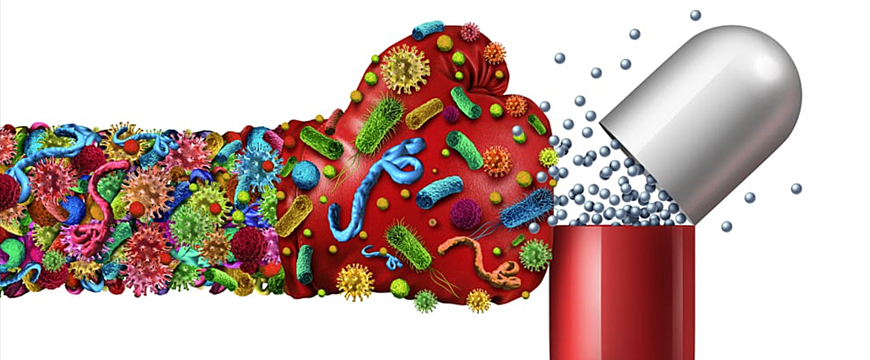
What is antibiotic resistance?
Antibiotic resistance is when bacteria change in response to antibiotic medicines being used against them. The more antibiotics are used, the more chance there is that the bugs will change and become resistant to the antibiotics.
When this happens, antibiotics can become less effective and, in some cases, may no longer work. This means some infections will no longer be able to be treated and will therefore become life-threatening.
Antibiotics are used to treat infections caused by bacteria. Other types of bugs such as viruses and fungi also cause infections and can also develop resistance to the medicines used to treat them. This is called antimicrobial resistance and includes antibiotic, antiprotozoal, antiviral and antifungal medicines.
Why is antibiotic resistance a problem now?
In the past, antibiotic resistance has been overcome by developing new antibiotics. This is a long and expensive process and there are very few new antibiotics in the development pipeline.
We therefore need to rely on the antibiotics we have now, so must use them wisely to keep their effectiveness for the future. If we don’t, we could face a future where antibiotics no longer work.
Antibiotic resistance kills?
The Department of Health has estimated that by 2050 ten million people will die around the world each year from antibiotic resistant infections.
That is more than cancer, road traffic accidents, diabetes and diarrhoeal disease (a high cause of death in developing countries) combined. Or, to put it another way, a person will die because of it every 3 seconds.
Antibiotic resistance affects all countries and is a global health priority.
How does this affect me, my family and my community?
Antibiotic resistance affects everyone.
Even if you have an infection that is only resistant to one or two antibiotics, the alternative medicine might take longer to cure the infection and may have more side effects.
Some people in the UK have already been infected with bacteria that are resistant to all antibiotics.
If that level of resistance becomes more common, complex surgery could carry life-threatening risks from infection – just as it did before antibiotics were discovered in the 1930s – and other procedures, including routine surgery, cancer chemotherapy and transplant operations, would become much more difficult.
Preventing infection is critical to beating antibiotic resistance
Prevention of avoidable infections leads to use of fewer antibiotics and fewer bacteria developing antibiotic resistance.
Preventing the spread of resistant bacteria from one person to another is just as important.
Infection prevention is therefore the starting point for beating antibiotic resistance.
This includes:
- Good infection control habits such as hand washing
- Vaccination to prevent infectious diseases
- Keeping hydrated to prevent urinary tract (bladder) infections
Use the following video and resources to help you perform hand hygiene correctly:
What can we all do to beat antibiotic resistance?
We all need to play our part by taking these simple steps to help protect antibiotics effectiveness:
Step 1
Listen to your doctor and don’t automatically demand antibiotics every time you see them.
Antibiotics can have little or no effect on many common infections such as coughs and colds, flus, and sore throats. Instead, ask a pharmacist about over-the-counter remedies to treat your symptoms.
Step 2
Take antibiotics exactly as they’re prescribed.
Never save unused antibiotics for future use.
Never give your antibiotics to someone else.
Step 3
Tell your friends and family about how important it is to use antibiotics properly.
Become an Antibiotic Guardian
- Watch and share this video on becoming an antibiotic guardian
- Make a pledge
Safe disposal of antibiotics
Unused or unwanted antibiotics can be returned to a local community pharmacy for safe disposal. Putting them in the bin or flushing them down the toilet can contaminate the environment, which may lead to more resistant bugs in the environment and harm wildlife and human health.
Further information:
Antimicrobial resistance – NHS England
Resources for healthcare professionals:
UK 20-year vision for antimicrobial resistance – GOV.UK
Addendum to the UK 5-year action plan for antimicrobial resistance 2019 to 2024 – GOV.UK
NHS England AMR resources and training
Pan Mersey:
The legacy Pan Mersey website has closed. Everything can now be found either in the legacy Pan Mersey Formulary, the new Cheshire and Merseyside Formulary or the ICB website.
NHS Futures pages for AMR:
FutureNHS Collaboration Platform – AMR
FutureNHS Collaboration Platform – Cheshire and Merseyside AMS Working Group